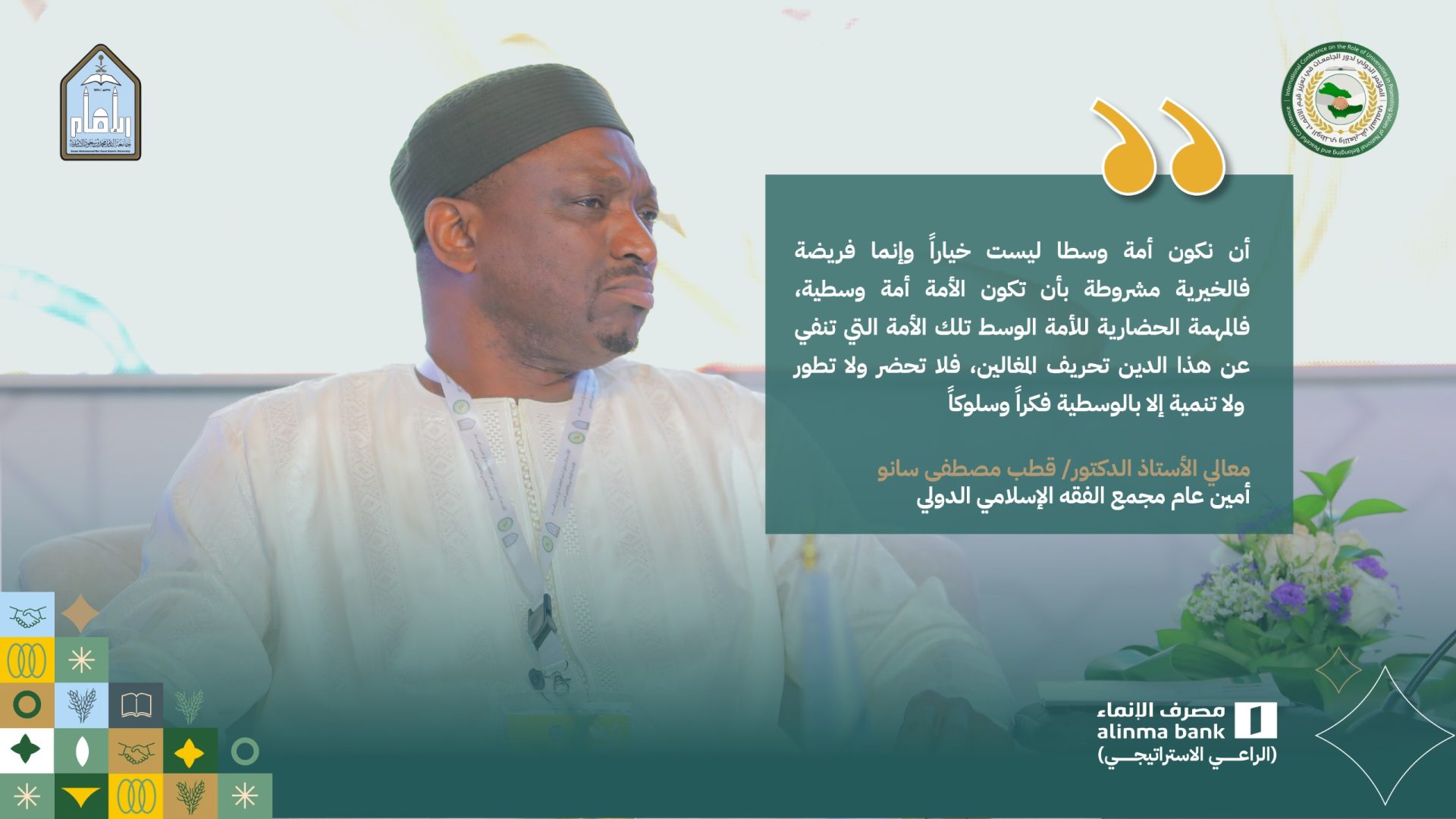
H.E. Prof. Koutoub Moustapha Sano, Secretary General of the International Islamic Fiqh Academy (IIFA), participated in the international conference entitled “The Role of Universities in Promoting the Values of National Belonging and Peaceful Coexistence”, organized by Imam Muhammad bin Saud Islamic University in Riyadh, under the patronage of the Custodian of the Two Holy Mosques King Salman bin Abdulaziz Al Saud, between 18-20 Shawal 1445, corresponding to 27-29 April 2024.
A group of experts and academics participated in the conference to present successful experiences and practices promoting national belonging and peaceful coexistence. The conference discussed the role of universities in achieving development and sustainability, promoting positive citizenship, spreading the culture of coexistence, tolerance, and moderation, and the values of national belonging in classroom curricula and extracurricular activities.
His Excellency delivered a speech at the conference’s third session, entitled: “Moderation and Temperance and their role in development and peaceful coexistence.” Moderation is a safety valve against fanaticism, excessiveness, decadence and extremism. It means goodness and righteousness, ease and tolerance, and standing away from extremism and fanaticism; as Allah said: “Allah intends for you ease and does not intend for you hardship” [Al-Baqarah 02:185″ He also said: “And Allah wants to lighten for you [your difficulties]; and mankind was created weak.” [Al-Nisa 04:28], and as reported in the hadith: “The religion is ease, but if anyone overdoes it, it gets the better of him; so keep to the right course, approximate to perfection, rejoice” narrated by Al-Bukhari, “And beware of going to extremes in religious matters, for those who came before you were destroyed because of going to extremes in religious matters.” narrated by Ahmad and Al-Nisai.
His Excellency added: “To be a middle nation is not an option but an obligation because the goodness of a nation is conditional on the nation being a middle nation, and the civilizational mission of the middle nation is to reject the distortion of its religion by the extremists. There is no civilization or true development without moderation in thought and behavior. The middle way is the best and safest choice for people, as our Lord said: {And thus we have made you a just community that you will be witnesses over the people and the Messenger will be a witness over you.} [Al-Baqarah 02:143; and The Lord said: “You are the best nation produced [as an example] for mankind. You enjoin what is right and forbid what is wrong and believe in Allah.” [Al-Imran 03:110]. Thus, His Excellency pointed out that a moderate and balanced person is the one able to live a peaceful life with all people, both those who agree and those who disagree, by weighing things with the balance of moderation and without excess, exaggeration or harshness.
His Excellency stressed that belonging to a motherland is one of the things that human beings are born with, and their life is not straight without a motherland, defining patriotism as belonging to the place where he settles, and it is also an emotional relation that manifests itself in singing about the motherland and nostalgia for it when he is expatriated. His Excellency reiterated, “Peaceful coexistence is a principle of Islam and its law that aims to preserve human dignity and preserve human life according to Islamic principles such as religious freedom, respect for others, and the right of all to live in safety and peace.”
His Excellency emphasized that diversity, difference and multiplicity is one of the divine laws which aim at achieving acquaintance, peaceful coexistence and tolerance, not conflicts, wars and disputes, hence it is essential to highlight Islam’s teachings of tolerance and establishing peaceful coexistence, justice and righteousness even with followers of other religions, as long as they do not fight against you. Human relations in Islam are based on respect for religious and intellectual pluralism and recognition of the other, aiming to build a civilization that works for the good of all mankind.
His Excellency also highlighted IIFA’s role in preaching moderation through its acceptance of the Ummah’s eight Islamic schools of law, not following one particular school over another, and its adoption of moderation as one of its core values. The IIFA has always strived to achieve this noble goal by studying issues and developments in light of Sharia’s purposes for the general welfare of people and nations.
Read Also
Lastest








